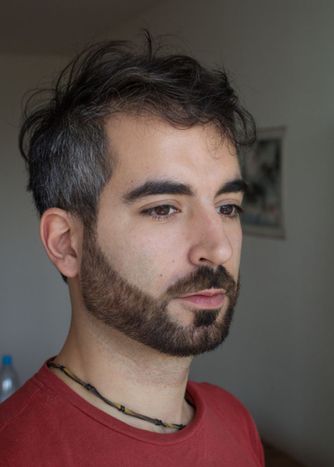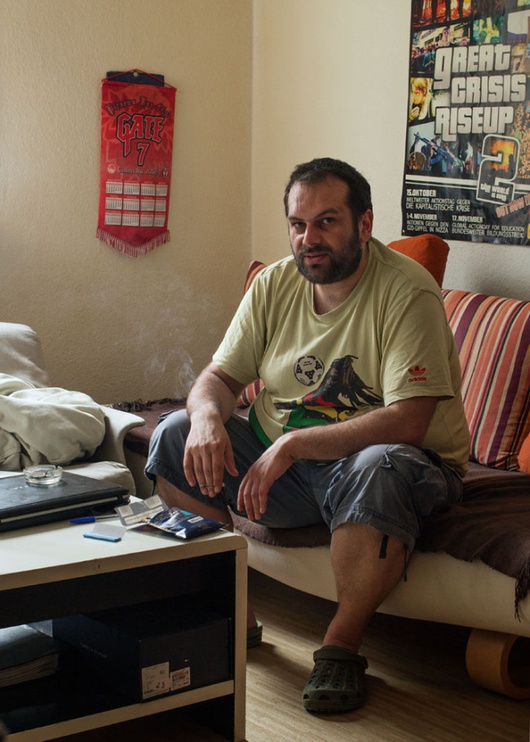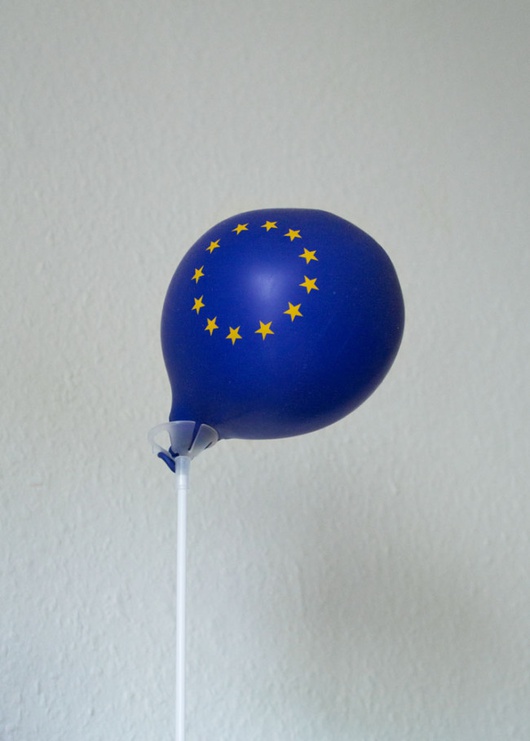
HELLO CRISIS: WHERE DOES YOUR SECOND HOME LIE?
Published on
Translation by:
 Danny S.
Danny S.
What does home mean to a Greek gardener in Berlin? And how long will a Spaniard last in Germany? The German-Chilean photographer Jean-Paul Pastor Guzmán won the Second Home Photography Contest with his Hello Crisis! (2012). In an interview he talks about the economic crisis, dynamic CVs and the sense of home.
Those who ask Jean-Paul Pastor Guzmán about his home have to be prepared to get more than one answer: "When I'm in Berlin, I might reply Buenos Aires. But when I travel through Argentina, I would rather say Germany. After all, I grew up and was culturally influenced here." Thanks to a father who moved from Chile to Germany when he was 20 years old, and a mother who revered the French actor Jean-Paul Belmondo in her youth, Jean-Paul has been caught between geographic regions since his birth. After graduating high school he moved to Buenos Aires, where he also spent a semester abroad during his later studies in graphic design at FH Aachen. Jean-Paul has been working as a photo assistant in Berlin now for nearly a year, and plans to stay.
Cuckoo Clocks and Grandma's China Set: What is home?
 "The term 'home' sounds a bit old-fashioned in German, because one immediately thinks of local history, cuckoo clocks and grandma's china set." Jean-Paul laughs as he searches for an acceptable definition of the English term "home." "Home is actually the place where you feel comfortable and secure. It's about memories, feelings and emotional bonds." That's why for him home is Aachen, where he spent his childhood and adolescence. But also Buenos Aires, where he had new experiences and met great people. But Jean-Paul is well aware that not everyone can so freely choose a second home: "In my project Hello Crisis!, with which I completed my Bachelor's degree in Aachen, the focus for me was young European migrants who had to abandon their home countries out of economic reasons. So, the Greeks, Spaniards and Italians who have sought their luck in recent years in Berlin."
"The term 'home' sounds a bit old-fashioned in German, because one immediately thinks of local history, cuckoo clocks and grandma's china set." Jean-Paul laughs as he searches for an acceptable definition of the English term "home." "Home is actually the place where you feel comfortable and secure. It's about memories, feelings and emotional bonds." That's why for him home is Aachen, where he spent his childhood and adolescence. But also Buenos Aires, where he had new experiences and met great people. But Jean-Paul is well aware that not everyone can so freely choose a second home: "In my project Hello Crisis!, with which I completed my Bachelor's degree in Aachen, the focus for me was young European migrants who had to abandon their home countries out of economic reasons. So, the Greeks, Spaniards and Italians who have sought their luck in recent years in Berlin."
He stumbled onto the idea for his photographic work because of a Spanish girlfriend who came to Germany to look for better prospects. "In Berlin you practically sit at the source, given the many southern Europeans and Latinos." For months Jean-Paul looked through Facebook groups such as Italiani a Berlino (Italians in Berlin; AdR), Movimiento 15-M, language schools in Kreuzberg, and by word of mouth for people who would talk about themselves and be photographed in their homes: "I portrayed a total of five Spaniards, three Italians and two Greeks. It was important for me to give the pictures a personal and textual dimension, not just to show anonymous and young faces of the crisis. That's why I portrayed Dimitris, Lucía and the others in their normal environment, and supplemented my photos with long interviews."
GERMANY AS AN INTERMEDIATE STOP: MOBILITY WITHOUT A GOAL?
Despite many similarities, the CVs of young European economic migrants are fundamentally different. Dimitris, for example, learned horticulture in Greece and precariously came to Germany as a "fortune seeker." He now works in a nursery in Berlin. Fátima, on the other hand, completed a degree in journalism in Spain and now bridges the waiting period with internships in Germany. Jean-Paul's work is based in realistic assessments: "I wanted to portray these life situations as genuine as possible, which is why I chose a more documentary style. So, just daylight, personal items, with hardly any staging." Some of the subjects are meanwhile no longer even in Berlin: "Some have already gone on to Poland, Tanzania and Portugal. For these, Germany was just an intermediate stop. That's why I'd find it interesting to meet up with all of them in one year and document their new whereabouts. It would certainly be an impressive example of the new mobility of the 21st century." Nevertheless, one should not be confused with Erasmus and similar programs. After all, this deals with completely different types of migration.
Some are in search of fun and move to Barcelona. Others need a job and choose Berlin. The reasons may be different, but the political and institutional frameworks are the same: in times of major European largesse, geographical boundaries are blurred for almost everything, from cheap flights to broadband Internet. To the "first home" is added the ambivalent "second home," which is a term coined by Cafebabel Berlin's photo competition. Jean-Paul actually sees this as something positive: "It's pretty normal to quickly get on a plane to Paris or to skype with a lover in Madrid. And it's also not a contradiction to have two homes." However, despite an increasing geographical fragmentation of identities, the opposite is also possible.
 "I noticed in Buenos Aires that many Argentines, Chileans and other South Americans simply designate themselves as latinos. This is an expression of a certain continental pride, which surely has its roots in colonialism and the oppression by the West." Maybe the same thing is currently happening in Europe, despite different historical and political premises: "Will we soon only designate ourselves as Europeans?" To Jean-Paul, this doesn't seem impossible. It wouldn't come so easily to him, should he begin looking for a second home. "Of course I like Buenos Aires a lot, but could I live there forever? I can't really picture it." Even Aachen has become too boring for him. In that case only Berlin remains? "Right now, most likely yes. Here I've truly arrived with heart and mind." At least there's an emotional bond here. And there are guaranteed to be plenty of latinos in the "international bubble" of Berlin with whom he could speak Spanish with, should Jean-Paul ever feel homesick for Buenos Aires.
"I noticed in Buenos Aires that many Argentines, Chileans and other South Americans simply designate themselves as latinos. This is an expression of a certain continental pride, which surely has its roots in colonialism and the oppression by the West." Maybe the same thing is currently happening in Europe, despite different historical and political premises: "Will we soon only designate ourselves as Europeans?" To Jean-Paul, this doesn't seem impossible. It wouldn't come so easily to him, should he begin looking for a second home. "Of course I like Buenos Aires a lot, but could I live there forever? I can't really picture it." Even Aachen has become too boring for him. In that case only Berlin remains? "Right now, most likely yes. Here I've truly arrived with heart and mind." At least there's an emotional bond here. And there are guaranteed to be plenty of latinos in the "international bubble" of Berlin with whom he could speak Spanish with, should Jean-Paul ever feel homesick for Buenos Aires.
Translated from Hello Crisis: Und wo liegt deine zweite Heimat?


